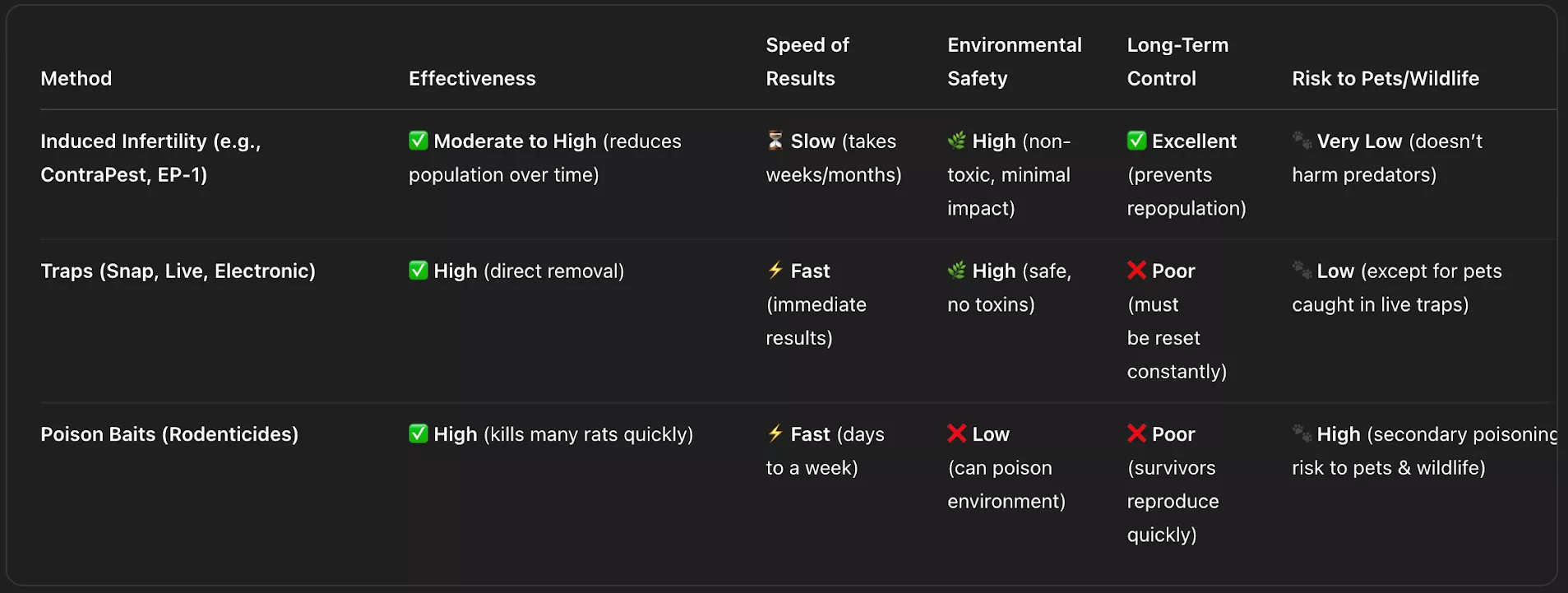SenesTech: The Smart Money’s Bet On Rodent Population Control

Image Source: DepositPhotos
When I first heard of this company and saw it was only a $3M market cap, I was ready to give a hard pass on that alone. But spending much of the year on my farm has taught me just how much trouble a tiny rodent can cause. They are nearly impossible to kill, they destroy crops wantonly, they cause diseases, they make life miserable. So when I saw that this company, SenesTech, Inc (SNES), develops a very smart way to control rats through induced infertility, I got interested.
Rats can transmit several diseases to humans, either directly through bites, scratches, or contact with their urine and feces, or indirectly via fleas, ticks, and mites. These diseases include:
-
Leptospirosis – Bacterial infection that can cause kidney damage, meningitis, liver failure, or respiratory issues.
-
Hantavirus – Causes severe respiratory illness, often linked to inhaling contaminated dust.
-
Salmonellosis – Food poisoning from consuming food or water contaminated by rat droppings.
-
Rat-Bite Fever – Bacterial infection that can cause fever, muscle pain, and rash.
-
Plague – Spread by fleas that infest rats, responsible for historical pandemics.
-
Tularemia – Bacterial infection that can lead to fever, ulcers, and pneumonia.
Rats are deadly little pests. Here’s a comparison - the two world wars together killed around 100 million people. World War 1 caused 15 million deaths. World War 2, the deadliest conflict in history, caused 85 million deaths. You know how many people were killed in the Black Death that occurred in Europe in the Middle Ages? 200 million. Yes, that’s right. These rats - responsible for the bubonic plague, caused by Yersinia pestis and transmitted by fleas on rats - caused the death of 200 million people between 1347 and 1351, decimating more than half of Europe’s population.
How do we control rat infestations? From my own experience, I have tried every method out there. Traps - nasty, needs manual removal, and rats are way too smart to fall into traps after a few catches; remove their food/water sources - cumbersome, way too much work, and they always find things to eat; sealing holes, controlling nests - also cumbersome, and rats find ways to circumvent these; poisons - I have pets, and poisons can harm animals that you don’t want to harm, plus they are often ineffective because rats are way too smart, and also, if a rat dies in some hole near the house, you can smell it for days. Bottomline: rat infestations are almost impossible to control.
SenesTech does this in the smartest way possible, by inducing infertility in rats through giving them palatable food that does no direct harm (no dead rat smell), does not involve removing them from traps, and does not harm pets or other wildlife but causes lower ovulation in female rats and lower sperm production in male rats.
Here’s a comparison:

Thus, for a proper control of rat infestations, a combination of short term measures along with SenesTech’s methods works best.
SenesTech is “the only manufacturer of US EPA registered and accepted products for the reduction of reproductive capacity in rodents,” according to their earnings call. They offer two basic products - ContraPest, the legacy product with a liquid formula, and Evolve, a newly launched soft-bait product. Here’s the EPA label for ContraPest that tells you everything you need to know about ContraPest. It is a liquid formulation containing two chemicals:
Active Ingredients:
4-Vinylcyclohexene diepoxide……………………...........0.09604%
Triptolide………………………………………………….0.00118%
while the key active ingredient in Evolve is cottonseed oil. It does not contain these two chemicals.
ContraPest is for indoor use only, and it requires a device, also manufactured by the company, for effective use. It can only be used in a controlled environment, e.g. warehouses, food storage, urban buildings. Evolve is the soft bait format that can be used outdoors and indoors, in a much broader area of application.
I have with me reports of a Lab study of Evolve which shows its efficacy to induce infertility in Sprague Dawley rats (lab rats). The study monitored animal health, bait consumption, toxicological effects, and fertility reduction over eight weeks of exposure.
Key Findings:
-
Animal Health: All rats remained healthy, with no illness, distress, behavioral changes, or weight loss observed.
-
Consumption: Both male and female rats consumed Evolve daily, even when chow and water were freely available, demonstrating high palatability.
-
Toxicology: No toxicity was observed. There were no differences in organ weights or morphological changes (liver, spleen, kidneys, heart, and adrenals) between treated and control groups.
-
Fertility Reduction:
-
Treated rats had significantly lower birth rates compared to controls.
-
Up to 61% fertility reduction was observed after one breeding round.
-
Treated males had reduced epididymis weights, indicating lower sperm density and germ cell damage.
-
A 12-month population model projected that continuous Evolve treatment could prevent rat population growth by over 90%.
-
Thus, Evolve effectively reduces rat fertility without toxicity or negative health effects. Its palatability ensures consistent consumption, making it a viable long-term population control strategy.
Marketing strategy and sales
SenesTech has developed a multipronged marketing strategy for its products. These are:
- Online retailing on Amazon (AMZN), WalMart (WMT), Tractor Supply Co. (TSCO), etc,
- Brick and mortar retailers.
- International partnering in countries like the Netherlands, India, Hong Kong and so on, and four, outreach to American cities like Baltimore (onboarded) and New York (pilot project being run).
Just last week, SenesTech announced two major international partnerships, in Australia and New Zealand, two countries which have large national programs aimed at eradicating rats and other pests. New Zealand is anticipated to spend over $4.5bn in the next 25 years on its Predator Free 2050 program, which aims to “eradicate invasive predators such as rats, stoats, and possums to safeguard native species.” Australia is also estimated to spend $100mn per year on pest control, a figure that is growing at a CAGR of 5%. In a bid to become part of these programs, SenesTech has applied for a license in these countries. New Zealand’s license is expected to be approved in the third quarter, with “stocking shipments beginning as early as late second quarter or early third quarter.” Senestech expects rapid increase in the demand for Evolve Rodent Birth Control to the tune of $500,000 or more.
In a video interview recently published on TalkMarkets (see at the 50 minute mark), CEO Joel Fruendt says they have already passed the major hurdles for approval in New Zealand, which include stability tests, toxicity tests and so on, and are waiting for approval in about 5 more months. The CEO noted that “typically, products that have passed these tests in the past have been approved.”
In the third quarter of 2024, SenesTech, Inc. reported a net loss per share of $2.07, surpassing expectations by $1.13. However, the company's revenue of $482,000 fell short by $100,000, representing a 33.89% year-over-year increase. Together, these two items mean two things - overall business efficiency and successful cost cutting measures, coupled with less than expected adoption of Evolve, which must necessitate better marketing.
About the first point, the company states:
From an OpEx standpoint, operating expenses were down 12% year-over-year despite the continued revenue growth as we became more efficient in our selling processes. The net result was our best quarterly adjusted EBITDA performance in company history, a 21% improvement from the year-ago third quarter.
To mitigate the adoption hurdle, the company has taken a number of steps. One, warehouse storage orders instead of retail outlet orders. Two, direct approach to manufacturer reps. Three, municipal programs. Four, global partnerships - these may not yield much in terms of immediate revenue, but this creates a reputation back home that translates to better revenue, back home. Finally, various other forms of outreach including regulatory, university, pest management professionals.
Bottomline
I personally do not invest in nanocap companies. But I can see the potential for a certain sort of savvy investor to make a lot of money here. This $3mn market cap company makes $500,000 in revenue - in one quarter. Such percentages are not usually seen in the larger cap sectors.
Related Articles:
SenesTech Has Built A Better Mouse Trap
SenesTech Expands Rapidly With Evolve, Poised For Breakout Growth In 2025
Pre-Market Prep: QQQ, NVDA, ASTS, SNOW, And SNES CEO Update On Big News
More By This Author:
GameSquare: At The Peak Of Its Game
NeurAxis: Should You Buy This IPO?
One-On-One With AMMO, Inc. Management
Author Disclosure: The author has no position in the stock discussed and no plans to initiate a position in the next 72 hours.
Disclosure: This article is part of a new ...
more



Loading comments, please wait...